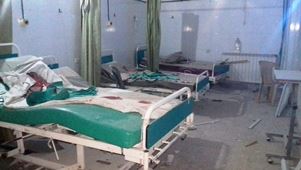 4 October 2016 – 3-year old Khalid* was badly injured when he was brought into the hospital. He was walking in the street when a blast erupted, destroying buildings around him and trapping him under the rubble. He was found by passers by, who took him and tens of other injured civilians by car to the closest functioning hospital. Khalid was taken by hospital staff to the operating room for immediate surgery. He had lost one of his legs and part of his pelvic area. Fortunately for Khalid, a surgeon was available at the hospital and was able to control the bleeding and perform an emergency surgical procedure.
4 October 2016 – 3-year old Khalid* was badly injured when he was brought into the hospital. He was walking in the street when a blast erupted, destroying buildings around him and trapping him under the rubble. He was found by passers by, who took him and tens of other injured civilians by car to the closest functioning hospital. Khalid was taken by hospital staff to the operating room for immediate surgery. He had lost one of his legs and part of his pelvic area. Fortunately for Khalid, a surgeon was available at the hospital and was able to control the bleeding and perform an emergency surgical procedure.
While Khalid was able to receive life-saving care, others are not so fortunate. 4-year old Hala* was taken to hospital in critical condition after a bomb exploded near where she and her sisters were playing. Hospital staff were unable to save her, and less than 24 hours later, Hala passed away. Her sisters, age 10 and 7, were seriously injured.
With less than 30 doctors available for more than 270 000 people in eastern Aleppo, few patients get the medical care they need. Since 23 September, 4 children have died to lack of functioning mechanical ventilators, and hospital staff are forced to perform manual ventilation on others in an effort to keep them alive. All 16 intensive care units in eastern Aleppo are now occupied, leaving little chance of survival for new patients.
Hospitals are overwhelmed and are struggling to respond to increasing needs. Since 23 September 2016, 342 people have been killed, almost one third of them children, and 1129 people have been injured. Actual figures are expected to be higher, given that these figures are those only being reported from health facilities.
Health facilities are unable to cope with huge increases of injured people. Many wounded patients are reported as being treated on the floor, and some patients are being turned away due to limited capacity. “Hospitals have limited stocks of medicines, medical supplies, fuel, and no support for health staff,” said local health directorate representative Dr Abdel-Rahman*. “We have no idea when new supplies will arrive, so we are being very careful about using what we have. Every day, people are dying because we do not have the capacity to treat them.”
Health personnel are working under very stressful conditions with a fear of being attacked as airstrikes continue. Since 23 September, 3 doctors who had remained in the eastern city to treat civilians and save lives were killed, and 2 nurses were injured. “The morale of health staff in eastern Aleppo is at its lowest,” said Dr Abdel-Rahman. “They are exhausted, mentally and physically. They are seeing their families, friends and colleagues dying around them, and they do not see any hope beyond the carnage they are dealing with every day.”
As hospitals continue to come under attack, only 7 hospitals remain partially-functional. 2 of the main trauma hospitals in the eastern part of the city were left out of service after an attack on 27 September, and only one has since partially re-established services. On 2 October, the only dialysis centre in the city was hit, leaving more than 60 patients at risk. Services in the centre were re-established on the same day of the attack. Every hospital in the city has been hit at least once, and one of the main trauma hospitals was hit 4 times in a 5-day period.
With increasing numbers of injured patients requiring trauma care inside the besieged city, and limited capacity of health staff to handle these cases, especially at the prehospital phase, WHO conducted its first remote training session via video-conference on 3 October from Gaziantep, Turkey, for 23 nurses and paramedics in eastern Aleppo on pre-hospital management. “The pre-hospital phase, when patients are transferred from the scene to a hospital, is the most critical phase in trauma care. Almost 80–90% of deaths occur during this phase,” said Dr Mohamed El Gazzar, WHO technical officer for surgery and trauma management. “This remote training by WHO was for the first responders (nurses and paramedics working near the front lines, in ambulance systems, civil defense and primary health care centres) who provide casualties with the care they need in the critical minutes after they are injured. If these health professionals are trained on how to handle patients as they are being transported to hospital, this can significantly increase their chance of survival.”
As many as 600 people in eastern Aleppo are unable to receive the medical treatment they need due to the besiegement of the city. As soon as access becomes possible, WHO is prepared to facilitate medical evacuations, and is pre-positioning emergency and surgical medicines and supplies from its hubs in Gaziantep and Damascus to reinforce its cross-borderand cross-line response.
* Names have been changed to protect the privacy of health staff and patients
Related link
WHO calls for evacuation of the sick and wounded from conflict areas


